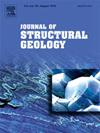从岩石的韧性变形到脆性变形之旅:传统地球科学如何从创新中获益 - 简介
IF 2.6
2区 地球科学
Q2 GEOSCIENCES, MULTIDISCIPLINARY
引用次数: 0
摘要
本文章由计算机程序翻译,如有差异,请以英文原文为准。
A journey through ductile to brittle deformation of rocks: How traditional geoscience benefits from innovations – An introduction
求助全文
通过发布文献求助,成功后即可免费获取论文全文。
去求助
来源期刊

Journal of Structural Geology
地学-地球科学综合
CiteScore
6.00
自引率
19.40%
发文量
192
审稿时长
15.7 weeks
期刊介绍:
The Journal of Structural Geology publishes process-oriented investigations about structural geology using appropriate combinations of analog and digital field data, seismic reflection data, satellite-derived data, geometric analysis, kinematic analysis, laboratory experiments, computer visualizations, and analogue or numerical modelling on all scales. Contributions are encouraged to draw perspectives from rheology, rock mechanics, geophysics,metamorphism, sedimentology, petroleum geology, economic geology, geodynamics, planetary geology, tectonics and neotectonics to provide a more powerful understanding of deformation processes and systems. Given the visual nature of the discipline, supplementary materials that portray the data and analysis in 3-D or quasi 3-D manners, including the use of videos, and/or graphical abstracts can significantly strengthen the impact of contributions.
 求助内容:
求助内容: 应助结果提醒方式:
应助结果提醒方式:


